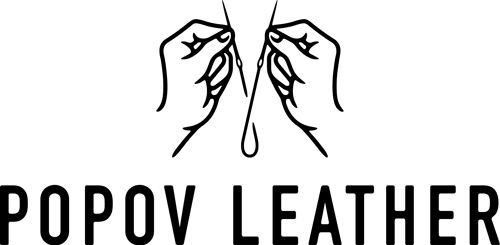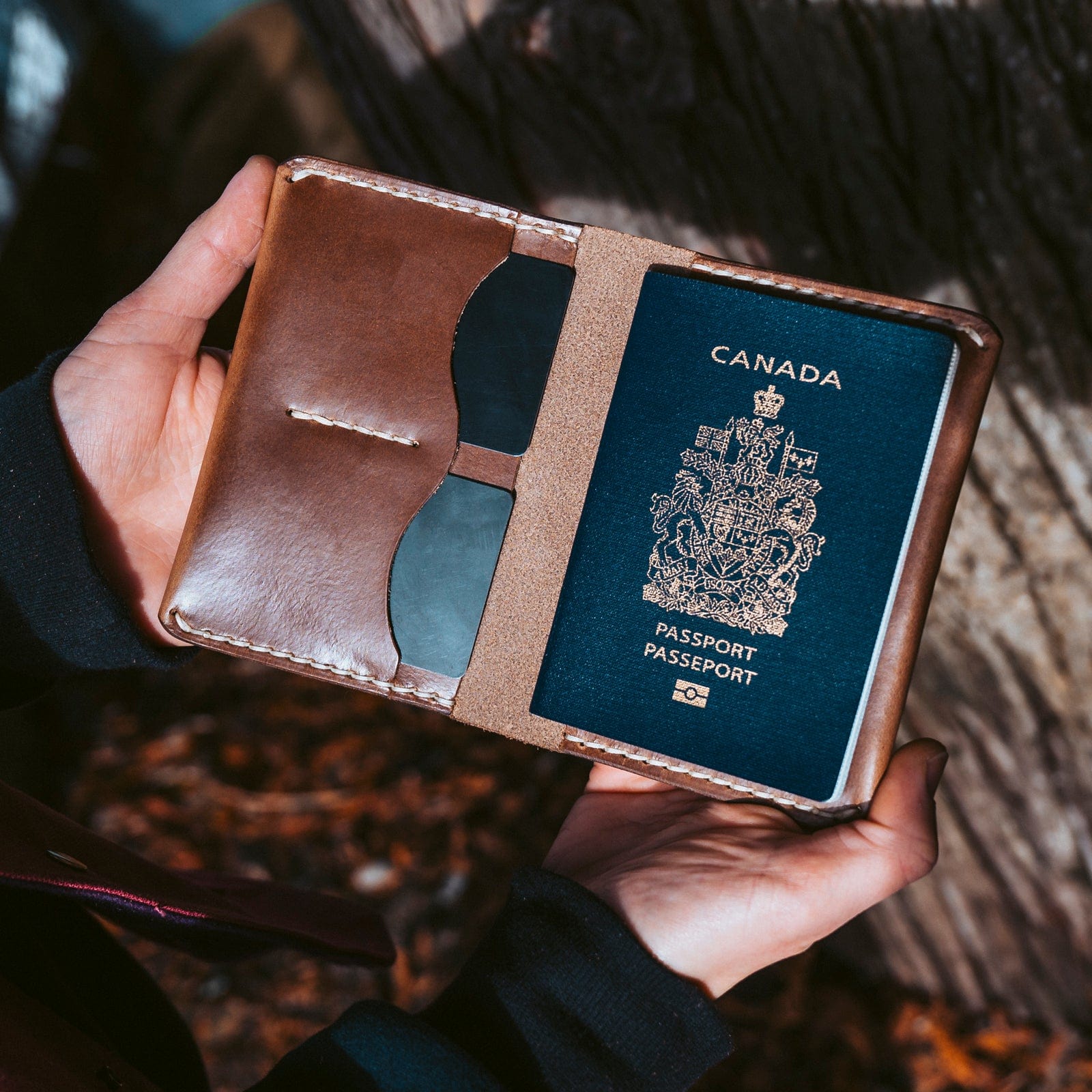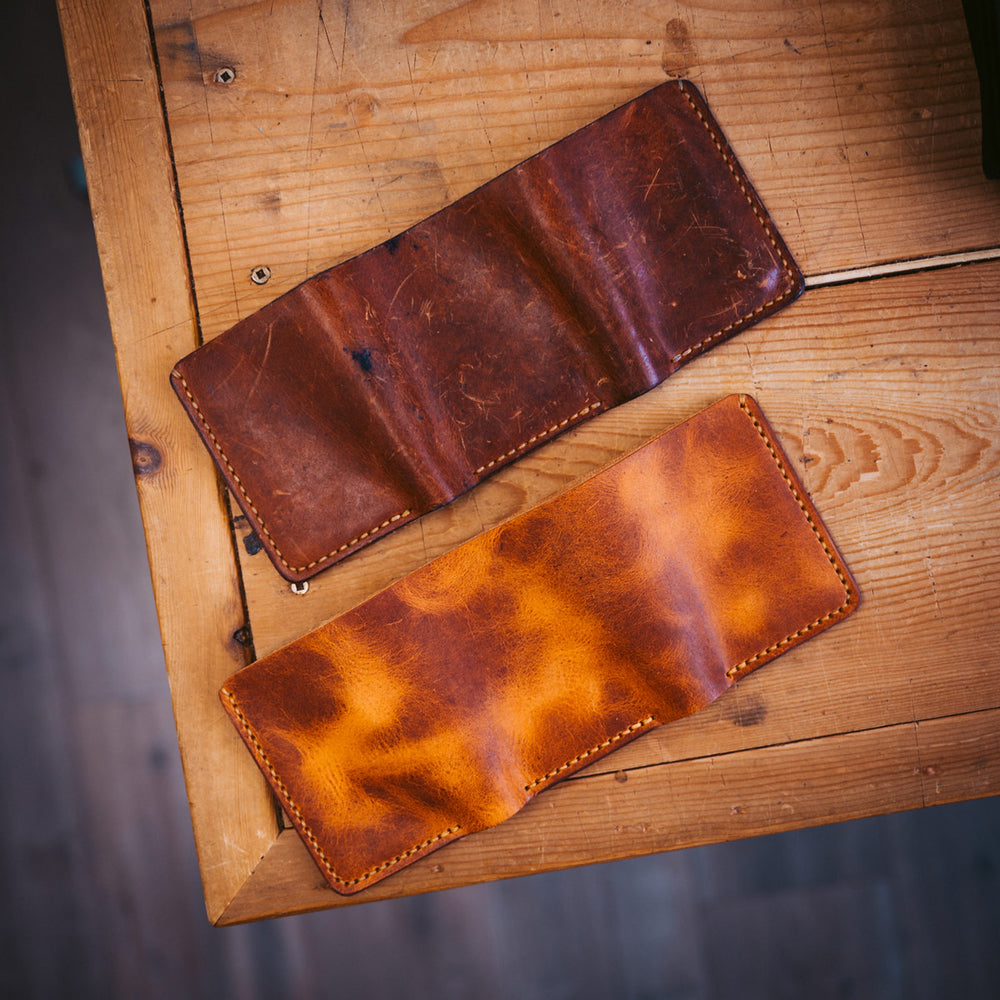Leather patina is a term that gets thrown around our craft, but what, exactly is it? And why do people care about it so much?
Patina is what forms on natural materials such as wood, denim, canvas, metal, and stone. It’s a signature of high-quality items not normally found on their cheaper counterparts (think of big box store jeans VS raw denim from Naked & Famous ).
Simply being worn, exposed to the elements, or handled creates a signature sheen and antiquing effect.
Metals and stones are not really thought of when we talk about Patina, but we look at the Statue of Liberty as a perfect example of copper patina. From a deep, golden color to its famous green.
Today, we’ll be focusing on Leather Patina – because that’s what Popov Leather is all about. In case you’re new here, we make stuff out of leather.
Table of Contents
The Definition of Patina
Why do People want Leather Patina?
How does Leather Patina Develop?
Which Leather shows the Best Patina?
Does genuine leather patina?
Will Patina affect the Quality of Leather?
How long does it take for leather to develop a patina?
How to get Leather Patina Faster
How to Slow Down Leather Patina
A Journey Without an End
The Definition of Patina
Leather patina is what makes full-grain leather stand apart from its cheaper counterparts such as “genuine” or “top grain” leather.
From the scratches and marks your keys make on your wallet to the darker spots on your journal cover where your hand always touches and rubs. Thus, leather Patina is something developed through everyday use.
The accumulation of dirt, body oils, sunlight, and wear and tear (like spilling a drink on a leather coaster) creates a darkening and soft sheen to leather goods. Consequently, the leather will over time oxidize and age naturally to give these effects.
This is a process that cannot be replicated through any artificial means.
It just takes time.
"Patina is the value that age puts on an object"
Why do People want Leather Patina?
There are 3 main reasons why leather patina is so sought after:
- It’s as unique as the person
- It looks better with age
- It’s a hallmark of high quality
Do you Prefer Character or Keeping your Leather Goods like NEW?
|
55.9%
Lots of Character 124 People Responded
|
42.8% 95 People RespondedSome Character |
1.4% 3 People RespondedLike New |
Based on 222 Surveyed Popov Leather Customers
Unique as the Person
For every wallet we make, no two will ever be the same. Even more so, after it ends up in someone’s hands.
Every leather wallet, book cover, belt, and keychain will develop patina and be as unique as the person who carries it. The darker the patina, the richer the story.
In other words: every item has a story to tell.
The character and personality formed on your leather goods are like a stamp of ownership that’s unique to every owner. Moreover, each wallet will tell you about the trips its been on, the times its been dropped on the ground, and every wrinkle formed through the opening and closing the billfold.
The true beauty of owning leather goods is that you’ll start to see yourself reflected more and more through use and time. Additionally, as your belt conforms to your waist or your wallet softens up in your pocket, it becomes a part of you.
Patina is a way of mapping a journey and telling a story about its owner.
Looks Better with Age
How many things do you own that get better with age?
Leather is almost alive. Moreover, it shows its age just like we do.
Leave your wallet out in the sun and it will tan. Scratch it and it will leave a scar. Patina is what happens when leather ages gracefully and is entirely unique to natural products.
Consequently, darkening with age and the personality that forms on every product is an effect that money cannot buy. This change comes only through age and through use. Similarly, for a 30-year-old scotch, these items will only get better with age.
As such, a beautiful patina will take time to form.
Some of our customers share photos of their well-loved leather goods.
The Hallmark of High Quality
As a matter of fact, only the highest grades such as full-grain leather develop rich character over time. Therefore, patina is a visible sign of quality.
The ability to age is a unique trademark of high-quality leather. These are the types of products that you hand down to your children.
Patina signifies heirloom quality.
Above: On the left is a brand new leather cardholder wallet. On the right is that same cardholder with 1 year of daily use.
How does Leather Patina Develop?
Indeed, the simplest way for patina to develop is through use. Handling your leather wallet is the easiest way to make your mark on it. It’s a long-term process that will show over time.
Additionally, scratches and scrapes also make up a huge part of the process. Over time these will fade, but make up the overall look, feel, and texture of well-worn leather goods.
A number of factors contribute to how patina develops over time:
- Oils on your hands
- Dust
- Moisture in the air
- Indigo dye from your jeans
- Sunlight
- Scratches, scrapes
"My wallet has a scratch from falling to the stage off my keyboard during a jazz trio concert or a smudge from being rubbed against the metal seats at a ballgame. It has been in the sun on the coast of Mexico once, and spends time up against the purple pen in my pocket. Maybe it looks more like me as a result."
Leather is an organic material that soaks up everything in its environment. Furthermore, even friction from your fingers or the way that you put your credit cards inside your wallet adds to the unique character and patina.
Over time a soft sheen will eventually develop. Lighter-colored leathers will darken up more dramatically, while darker leathers may be more subtle. Deep scratches or dents will smooth over and slowly fade away. Wrinkles where folds form become more pronounced.
Embrace the way you live your life with your leather goods; the richness in patina will form from every bump along the way. Consequently, the less you worry about leather’s pristine condition, the more worn-in and beautiful the result will be.
What is your favorite feature of leather patina?
|
25.5% 56 People Responded |
21.4% 47 People Responded |
17.7% 47 People Responded |
|
7.7%
|
25.5%
|
25.5%
|
Based on 220 Surveyed Popov Leather Customers
Which Leather shows the Best Patina?
Natural vegetable tanned leather without any dyes or pigments shows the best patina over time. This leather is almost like a sponge – soaking up anything it touches. It’s particularly susceptible to sunlight and body oils.
Full-grain leathers that have dyes and pigments added are second best when it comes to developing patina. These leathers are considered the highest grade of leather. Not only are they the most durable, but they will develop an amazing patina over time.
Above: On the left is a brand new leather 5 card wallet. On the right is that same cardholder with 1.5 years of daily use.
Does Genuine Leather Patina?
Since Genuine Leather is a lesser grade of leather (see our article on leather grades) it will not develop patina in a good way.
Full or Top grain leather will develop a rich patina through exposure to the sun, oils in your hand and wear. But Genuine Leather (also known as Bicast leather) will crack, flake and chip over time due to how it's "processed." Genuine leather is a heavily processed blend of several layers of split leather bonded together.
Will Patina affect the Durability or Quality of Leather?
Leather patina has zero impact on longevity or strength. If anything, as mentioned above, it only increases the beauty, value, and feel of the product.
Wear and tear is what full-grain leather goods are built for.
Do not fear the patina – embrace it!
While I’ve made my point that patina is something to be desired, there are often 2 camps when it comes to leather goods owners. Those who want patina as quickly as possible and those who want to keep their leather goods in pristine condition.
"Both my wallet and notebook cases from Popov leather have experienced several continents over the past 5-6 years. There is one particular scratch on my notebook cover that I can pick out every time. It happened about 4 years ago when my then girlfriend accidentally scratched it. Unrelated it was also the last day we were together. It's a bitter-sweet memory but it gets me every time."
How long does it take for leather to develop a patina?
The short answer is: it depends. The long answer is that leather patina happens as you use the product, so the more you use it, the faster patina develops. Also, if you condition and clean your leather goods, that can possibly delay the onset of patina.
We surveyed 218 Popov Leather customers and asked them this question, over half of them said that it took up to 6 months before they broke in their leather goods and started to develop a patina.
How long did it take you to break in your leather goods?
|
38.1%
6 Months 83 People Responded
|
29.4% 64 People Responded1 Month |
11% 24 People Responded1 Year |
|
11.5%
Other 25 People Responded |
10.1%
1 Week 22 People Responded
|
|
Based on 218 Surveyed Popov Leather Customers
Tips on how to get Leather Patina Faster
The absolute best way to speed up the patina process is to simply use your leather goods without being delicate. Therefore, throw your wallet around, and let it get dinged up and scratched.
A little water from the rain won’t hurt it either. The more you use your item, the faster it patinas.
Leave your goods out in the sun during the afternoon, let them get a tan. Just like your skin, the natural leather will begin to tan when exposed to the sun.
Friction causes patina quickly; leaving your wallet or key chain in your pocket all the time is a great way to speed up the process.
"I live an active life, in the outdoors and traveling the world. My wallet earned it's scars falling through the rocks in the mountains outside of Valencia Spain...getting dropped and kicked in the streets of Buenos Aires...briefly getting lost on the swamps of the Everglades...but most of the scars come from my dog, when I have him retrieve the wallet from my bedside table because I don't want to go get it myself."
Going for a walk along the ocean? Rain and seawater mist can form marks that also create darker patches.
And don’t worry about washing your hands so much – let natural oils from your fingers and palms soak into your leather goods. This tip is a little extreme, but you get the idea.
Speaking of oils: mink or vegetable oil can be rubbed into leather. Once it’s absorbed the leather will take on a darker appearance. Don’t use too much though.
In summary: don’t be so careful around leather goods and enjoy the journey.
Tips on how to Slow Down Leather Patina
If you’re someone who wants to slow down the leather patina process you can do a few things to keep your items like new.
I’ll never understand why you would want to, but there are options. Keep in mind that patina will still form, but it will take much longer.
General Tips on Slowing Down Patina
Firstly, consider how you store your leather goods. Leather needs to breathe and requires ventilation to prevent mildew or rot from setting in. Never leave your leather goods in plastic bags or damp areas.
Secondly, avoid direct sunlight on any of your goods.
Furthermore, avoid handling or storing leather goods in your pockets for an extended duration of time. Friction and oils from your hands/pockets can darken or discolor leather goods.
Apart from the above, the best way to slow down the patina process dramatically is:
- Cleaning your leather goods
- Conditioning your leather goods
- Sealing your leather goods
Do you Condition, Clean or Waterproof Leather Goods?
|
61.5%
Yes 136 People Responded
|
38.5% 85 People RespondedNo |
Based on 204 Surveyed Popov Leather Customers
Cleaning your Leather Goods
Constant care and attention to your leather is required to keep your goods in perfect condition. The biggest part of upkeep includes cleaning your goods after every use.
Furthermore, leather cleaners remove grease from dirt, dust, and oils absorbed through using the product.
When seeking out a leather cleaner, the best ones contain surfactants that attract dirt from the cracks and crevices of leather. Never use regular soap as this can dry out the leather and cause cracking.
Always use solutions with neutral pH and without alcohol or abrasives (these can damage the leather).
Leather Cleaners we Recommend
There are many excellent and non-toxic cleaners available currently. Here are the ones we recommend:
Directions for Cleaning
While you can use Saddle Soap to remove grime, it’s our recommendation to seek out Lexol leather cleaner. Saddle Soap works – but it has a high amount of fat and oils which can darken the leather coloring. Instead, we recommend Saddle Soap is used for conditioning and sealing.
The easiest way to keep your leather goods clean is to simply wipe them down with a microfiber cloth whenever they are exposed to the elements.
- Remove dirt build-up by first wiping the item with a soft cloth.
- Apply a dime-size portion of the cleaner to the item
- Wipe in a circular motion
- Remove excess cleaner with a dry cloth
- Let the cleaner set
- Wipe the item every time it’s used. This simple action will preserve the appearance for months.
"I challenged myself to run 5 km to work every day for a year in Calgary. Every morning, I would throw in my driftwood cardholder in my backpack along with my keys. As I ran, the keys left small scratches on my cardholder."
Conditioning your Leather Goods
Cleaning is great for keeping the leather pristine, but like our skin, it also needs moisturizer. That’s where leather conditioner comes in. Conditioners add moisture to the leather and keep the surface soft and supple.
Leather Conditioners we Recommend
Here are some non-toxic and gentle leather conditioners we recommend for most leather goods:
Directions for Applying Leather Conditioner
These can be applied in small amounts and rubbed into leather. A good rule of thumb is to condition once per month to keep your leather goods looking shiny and healthy. This can also depend on where you live – more arid or dry locations will require more moisturizing.
- Apply a dollop of conditioner to a soft cloth.
- Gently rub conditioner into the leather
- Use a soft dry cloth to remove excess conditioner
- Let sit for 6 hours as leather absorbs the oil
Sealing your Leather Goods
The final step of the overall care process is to seal the top layer of the leather with a protectant.
A protectant stops natural oils and moisture from escaping leather. This is great for items that are exposed to natural environments and in particular the sun.
Products we Recommend
Directions for Applying Leather Protectant
Leather Protectant can add years to the life of any leather product. Although not totally necessary (we prefer the patina!) it will help preserve the original look of your leather.
- Apply a dollop of protectant to a soft cloth.
- Gently rub protectant into leather
- Use dry soft cloth to bring a polish to the surface
- Ready to use immediately
A Journey Without an End
Patina can look different on any type of leather goods. It’s as unique as the person who carries it and tells a story about their life.
The common thread between all well-loved leather goods is that they get better with age and that no two are alike. Moreover, it’s a feature that’s highly sought by folks who appreciate high-quality leather goods.
Leather patina doesn’t have a destination or an end. It’s meant to be an experience that continues to evolve with its owner. Whether you strive for wear and tear or take the utmost precautions with your leather goods; patina is inevitable.
Therefore, embrace those scratches, dings, and nicks on your leather wallet.
These are the permanent etchings of your life told through a cherished object.
Detailed Review From a Happy Customer
"I think it was during your 5 year anniversary sale that I purchased two belts. They were intentionally bought 2 sizes too small with the thought that I would lose the weight and it would be a motivational tool.
Consequently, I put those belts somewhere I would see them everyday. It was a reminder of who I was and who I wanted to be.
Well, I'm happy to admit I'm down about 30lbs (13kilos) and I finally fit into those belts. Only on the 2nd hole right now but it's been a huge confidence booster, and it gives me more motivation to lose the last 10-15lbs to get to my goal weight.
Would I have lost all this weight without the belts? Probably, I had a lot of other influencing factors in my life 4 months ago that pushed me to change. Did having the belts motivate me to keep moving when things got tough? Hell yes.
If you read all this, thanks. I know it's a personal story that you don't have much vested interest in.
The main take away is that if I wasn't so in love with patina, and if you didn't make such beautiful leather goods, I would have no tangible way of remembering this experience."
Written by Ryan Popoff
Ryan Popoff is the creative mind behind Popov Leather wallets, iPhone cases, belts, watch bands and journals since 2013. With a Bachelor Degree in Fine Arts, my leatherworking journey began at home. I wanted to create a simple leather wallet that could fit into my front pocket and — to my delight — it was a hit with family and friends. Hopefully you love our honest, quality leather goods too! Reach out with questions.

















